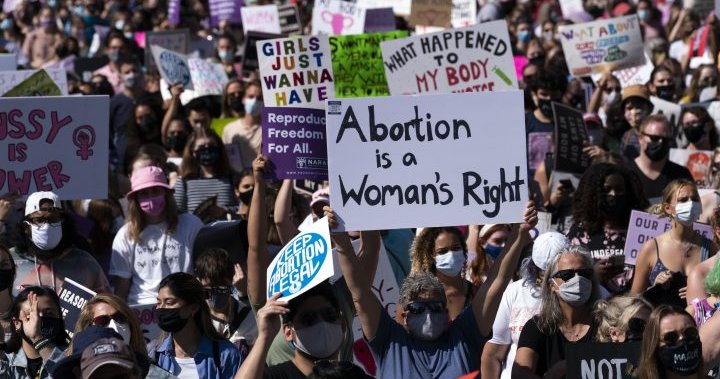
‘Mind your own uterus’: U.S. women march for abortion rights
Global News
Organizers say hundreds of abortion-themed protests around the country will take place on Saturday.
The first Women’s March of the Biden administration heads straight for the steps of the Supreme Court on Saturday, part of nationwide protests demanding continued access to abortion in a year when conservative lawmakers and judges have put it in jeopardy.
Thousands of women filled a square near the White House for a rally before the march. Many waved signs that said “Mind your own uterus,” “I love someone who had an abortion” and “Abortion is a personal choice, not a legal debate,” among other messages.
Some wore T-shirts reading simply “1973,” a reference to the landmark Roe v. Wade decision, which made abortion legal for generations of American women.
Elaine Baijal, a 19-year-old student at American University, took cellphone photos with her friends and their signs as the event started. She said her mother told her of coming to a march for legal abortion with her own mother in the 1970s.
“It’s sad that we still have to fight for our right 40 years later. But it’s a tradition I want to continue,” Baijal said of the march.
Organizers say the Washington march will be among hundreds of abortion-themed protests around the country Saturday. The demonstrations come days before the start of a new term for the Supreme Court that will decide the future of abortion rights in the United States, after appointments of justices by President Donald Trump strengthened conservative control of the high court.
The march is part of “a fight to secure, safeguard, and strengthen our constitutional right to an abortion,” Rachel O’Leary Carmona, executive director of the Women’s March, said in a statement. “And it’s a fight against the Supreme Court justices, state lawmakers, and senators who aren’t on our side _ or aren’t acting with the urgency this moment demands.”
The march comes a day after the Biden administration urged a federal judge to block the nation’s most restrictive abortion law, which has banned most abortions in Texas since early September.

 Run 3 Space | Play Space Running Game
Run 3 Space | Play Space Running Game
 Traffic Jam 3D | Online Racing Game
Traffic Jam 3D | Online Racing Game
 Duck Hunt | Play Old Classic Game
Duck Hunt | Play Old Classic Game